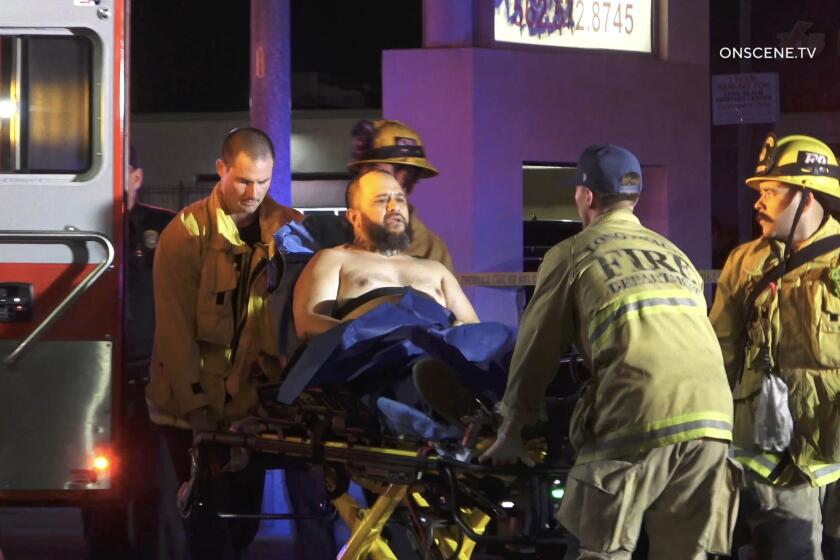Prominent L.A. judge advocated for civil rights
Judge Jack Tenner, a retired Los Angeles County Superior Court jurist who was involved in many of the city’s civil rights struggles over the last 60 years, including fighting restrictive housing covenants in the 1940s and helping to elect some of the area’s most prominent African American officeholders -- including the late Mayor Tom Bradley -- has died. He was 88.
Tenner died Oct. 13 at his home on Los Angeles’ Westside of complications from Parkinson’s disease, his family said.
The former longtime attorney, who was white, served on the bench for 10 years until he retired in 1990 and became a private judge and mediator. A specialist in personal-injury, product-liability, malpractice and wrongful-termination cases, he was known for his fairness and powers of persuasion that brought warring parties to the settlement table. He handled complex, multimillion-dollar settlements as a private judge or mediator in cases such as the Erin Brockovich lawsuit involving water contamination by Pacific Gas & Electric in Hinkley, Calif.
In the 1990s he became known to the wider public for his commentary on the O.J. Simpson murder trial for the Larry King show on CNN.
Outside the courtroom, Tenner was known as a committed fighter for civil rights.
“Everyone knew Jack Tenner as a hero in our community,” Rep. Diane Watson (D-Los Angeles), who knew him for 40 years, said in an interview last week. “If integration was at stake, Jack was involved. . . . You didn’t have to convince him there was inequality -- he let you know.”
Tenner was born Oct. 2, 1920, in Kiev, Ukraine. Five years later, he fled what was then a Soviet republic with his parents to escape the persecution of Jews. They immigrated to Canada, then to the United States, and eventually settled in Chicago, where he earned his law degree at DePaul University. After passing the Illinois bar in 1942, he joined the Navy and fought in the Pacific during World War II.
He arrived in Los Angeles in 1946. After passing the California bar in 1947, he became involved in civil rights issues.
Until the mid-1950s, the Los Angeles County Bar Assn. had a whites-only membership rule. Black lawyers formed their own organization, the John M. Langston Law Club. When Tenner learned of the inequity, he “insisted he wasn’t going to allow the Langston Law Club to be a segregated law club. He was the first white member,” said Leo Branton Jr., a civil rights attorney who has represented Angela Davis, Nat King Cole and other prominent African Americans.
“Everyone looked upon Jack as being black. He was more active in black affairs than most of the black lawyers were,” Branton said.
Tenner also joined the fight to integrate firehouses in Los Angeles. In the 1950s, black firefighters were restricted to serving in two fire stations on Central Avenue, and opportunities for advancement were severely limited. After the 1954 U.S. Supreme Court decision in Brown vs. Board of Education outlawed school segregation, however, the doors to the city’s firehouses were forced open too. Tenner and lawyers for the American Civil Liberties Union helped black firefighters break down the barriers.
“Jack Tenner and the ACLU were very, very helpful,” said Arnett Hartsfield, a retired firefighter and attorney who helped organize the integration effort. “They met with us, encouraged us, joined us in pushing the issue before the chief. . . . I think the biggest thing was . . . giving us encouragement that we weren’t alone. Everywhere we looked there was opposition.”
Tenner also worked to eliminate housing discrimination. In midcentury Los Angeles, blacks were prevented from owning homes in most neighborhoods because of property deeds with clauses forbidding sales to nonwhites. Tenner helped black lawyers, judges and others circumvent these restrictive covenants by posing as the buyer. He often was accompanied by the black friends who wanted the houses, but he introduced them as members of his domestic staff. After he closed the deal, he turned the property over to them.
One of the houses Tenner bought was for baseball great Frank Robinson in Baldwin Hills.
When Robinson moved in, neighbors launched a petition drive to force him to move. But, as Tenner recalled in a 2003 interview in the Jewish Journal, “kids in the neighborhood found out it was Frank Robinson. So they went to his house, asked him to come out and play ball with them. Which he did. He spent a day or two teaching them how to hold a bat, to throw a ball. And the whole fight dissolved.”
Tenner also helped Bradley buy a house on Welland Avenue in Leimert Park, years before he moved into the Getty Mansion as mayor. When Bradley began to run for office, Tenner was one of his most diligent supporters on the Westside.
He raised campaign funds and wrote many of his speeches. When Bradley became mayor, he named Tenner to the city Recreation and Parks Commission and the Airport Commission.
He was a mentor to many black politicians, including Los Angeles County Supervisor Yvonne B. Burke, who was elected to the state Assembly in the late 1960s before becoming the first African American woman elected to Congress from California.
“He gave the first event for me in his house,” said Burke, recalling the fundraiser that kicked off her first campaign.
He was, she added, “a great speechwriter” who helped her with the nominating speeches she gave when Jerry Brown ran for president and when Walter Mondale and Sargent Shriver ran for vice president.
Tenner was a large man with a commanding and colorful style who contributed his formidable powers to a number of progressive causes. At a Beverly Hills fundraiser for the nuclear freeze movement some years ago, he made a lasting impression on Dr. Helen Caldicott, founder of Physicians for Social Responsibility.
“I gave my usual hard-hitting and emotional speech,” Caldicott wrote in a 1997 memoir. “At the end, a retired Superior Court judge . . . named Jack Tenner got up and fixed the audience with a beady eye. Dark, short, stocky and intense, he said, ‘I can see $30,000 in this room, and nobody is leaving until we have collected.’ He then accosted each person individually and, by God, he got the money. I’ve never seen anything so provocative in my life, and the crowd loved it.”
Tenner was married twice. His first wife, Hallie, died in 1978. He is survived by his second wife, Georgann; a son, Scott; a daughter, Monica; a brother, Alvin; and eight grandchildren. Services were private.
--
More to Read
Start your day right
Sign up for Essential California for news, features and recommendations from the L.A. Times and beyond in your inbox six days a week.
You may occasionally receive promotional content from the Los Angeles Times.







